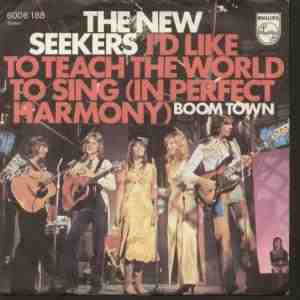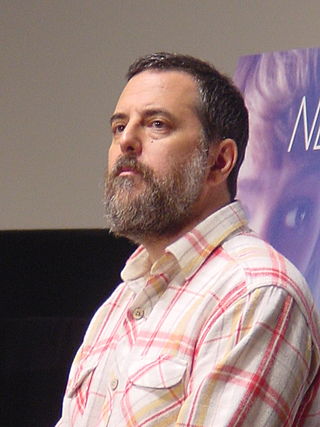
The iPod was a series of portable media players and multi-purpose mobile devices that were designed and marketed by Apple Inc. from 2001 to 2022. The first version was released on November 10, 2001, about 8+1⁄2 months after the Macintosh version of iTunes was released. Apple sold an estimated 450 million iPod products as of 2022. Apple discontinued the iPod product line on May 10, 2022. At over 20 years, the iPod brand is the longest-running to be discontinued by Apple.

"I'd Like to Teach the World to Sing (In Perfect Harmony)" is a pop song (originally known as "True Love and Apple Pie") by British hit songwriters Roger Cook and Roger Greenaway, and sung by Susan Shirley.

A television advertisement is a span of television programming produced and paid for by an organization. It conveys a message promoting, and aiming to market, a product, service or idea. Advertisers and marketers may refer to television commercials as TVCs.

"1984" is an American television commercial that introduced the Apple Macintosh personal computer. It was conceived by Steve Hayden, Brent Thomas, and Lee Clow at Chiat/Day, produced by New York production company Fairbanks Films, and directed by Ridley Scott. The ad was a reference to George Orwell's noted 1949 novel, Nineteen Eighty-Four, which described a dystopian future ruled by a televised "Big Brother". English athlete Anya Major performed as the unnamed heroine and David Graham as Big Brother. In the US, it first aired in 10 local outlets, including Twin Falls, Idaho, where Chiat/Day ran the ad on December 31, 1983, at the last possible break before midnight on KMVT, so that the advertisement qualified for the 1984 Clio Awards. Its second televised airing, and only US national airing, was on January 22, 1984, during a break in the third quarter of the telecast of Super Bowl XVIII by CBS.

Tango is a carbonated soft drink originating in the United Kingdom, primarily sold in the UK and Ireland. It was first launched by Corona in 1950. Corona was purchased by the Beecham Group in 1958, and Corona Soft Drinks by Britvic in 1987.
Switchers was an advertising campaign launched by Apple Computer on June 10, 2002. It featured what the company referred to as "real people" who had "switched" from the Microsoft Windows platform to the Mac. An international television and print ad campaign directed users to a website where various "myths" about the Mac platform were "dispelled". The television commercials were directed by Errol Morris.

The iPod Shuffle is a discontinued digital audio player designed and formerly marketed by Apple Inc. It was the smallest model in Apple's iPod family, and was the first iPod to use flash memory. The first model was announced at the Macworld Conference & Expo on January 11, 2005; the fourth- and final-generation models were introduced on September 1, 2010. The iPod Shuffle was discontinued by Apple on July 27, 2017.

"Think different" is an advertising slogan used from 1997 to 2002 by Apple Computer, Inc., now named Apple Inc. The campaign was created by the Los Angeles office of advertising agency TBWA\Chiat\Day. The slogan has been widely taken as a response to the IBM slogan "Think". It was used in a television advertisement, several print advertisements, and several TV promos for Apple products.
Mr. Six is an advertising character since 2004 for an advertising campaign by the American theme park chain Six Flags. Despite appearing as an elderly man wearing a tuxedo and thick-framed glasses, he is able to perform frenetic dance routines, usually to an instrumental version of the Vengaboys song "We Like to Party". Mr. Six last appeared in 2010, with Six Flags stating the character was on a hiatus. On June 25, 2024, Six Flags brought Mr. Six back in a Fright Fest ad after 14 years.

Datarock is a Norwegian electronic rock band. The band, known for wearing red jumpsuits, formed in 2000. Original personnel were Fredrik Saroea, Ketil Mosnes and Kevin O'Brien, who soon hired Tom Mæland. O'Brien and Mæland later left the band, but the duo of Saroea and Mosnes continued the project.

The iPod Nano is a discontinued portable media player designed and formerly marketed by Apple Inc. The first-generation model was introduced on September 7, 2005, as a replacement for the iPod Mini, using flash memory for storage. The iPod Nano went through several models, or generations, after its introduction. Apple discontinued the iPod Nano on July 27, 2017.

Wieden+Kennedy is an American advertising agency best known for its work for Nike. Founded by Dan Wieden and David Kennedy, and headquartered in Portland, Oregon, it is one of the largest independently owned advertising agencies in the world.

"Someday Baby" is a Grammy Award-winning blues song written and performed by American singer-songwriter Bob Dylan, released as the fifth track on his 2006 album Modern Times. The song had considerable success, garnering more airtime on U.S. radio than any other track on the album. It spent twenty weeks on Billboard's Adult Alternative Songs chart, peaking at #3 in November 2006. It was also anthologized on the compilation album Dylan in 2007.
Apple Inc. has had many notable advertisements since the 1980s. The "1984" Super Bowl commercial introduced the original Macintosh mimicking imagery from George Orwell's 1984. The 1990s Think Different campaign linked Apple to famous social figures such as John Lennon and Mahatma Gandhi, while also introducing "Think Different" as a new slogan for the company. Other popular advertising campaigns include the 2000s "iPod People", the 2002 Switch campaign, and most recently the Get a Mac campaign which ran from 2006 to 2009.

Anticipation is an Irish advertisement launched by Guinness plc in 1994 to promote Guinness-brand draught stout. The advert, which appeared in print, posters, and cinema and television spots, was conceived by Irish advertising agency Arks, and starred relatively unknown Irish actor Joe McKinney as the 'Dancing Man' and Gordon Winter as the barman. It was the final part of the "Guinness Time" advertising campaign, which had been running in Ireland since the late 1980s.

The Advertising Standards Authority (ASA) is the self-regulatory organisation of the advertising industry in the United Kingdom. The ASA is a non-statutory organisation and so cannot interpret or enforce legislation. However, its code of advertising practice broadly reflects legislation in many instances. The ASA is not funded by the British government, but by a levy on the advertising industry.

Apple Inc. has produced and sold headphones since 2001, available for standalone purchase and bundled with iPhone and iPod products. Apple's current product line consists of EarPods, AirPods and AirPods Pro, and AirPods Max.
Dougal Stewart Wilson is an English director of commercials, music videos and films. His work includes directing several John Lewis Christmas adverts and the Grammy-nominated music video for "Life in Technicolor II" (2009) by Coldplay. He made his feature film debut with Paddington in Peru (2024), the third instalment in the Paddington franchise.

The Japanese technology company, Sony, engaged in a variety of different marketing efforts, as one of the world's largest and most pervasive corporations.

American filmmaker Mark Romanek directed his first music video in 1986, for The The's "Sweet Bird of Truth". He earned his first MTV Video Music Award for Best Direction nomination for "Free Your Mind", performed by En Vogue, in 1993. Romanek later directed "Closer" for the industrial rock band Nine Inch Nails, which contains imagery involving terror, sexuality, and animal cruelty. In 1995, he directed the video for "Scream", set in space and performed by Michael and Janet Jackson, as well as the New Age surrealistic "Bedtime Story", performed by Madonna. They are two of the most expensive music videos ever made, costing $7 million and $5 million, respectively. "Scream" gained 11 nominations at the 1995 MTV Video Music Awards, including Romanek's second Best Direction nomination, and his first Grammy Award for Best Music Video, Short Form.















